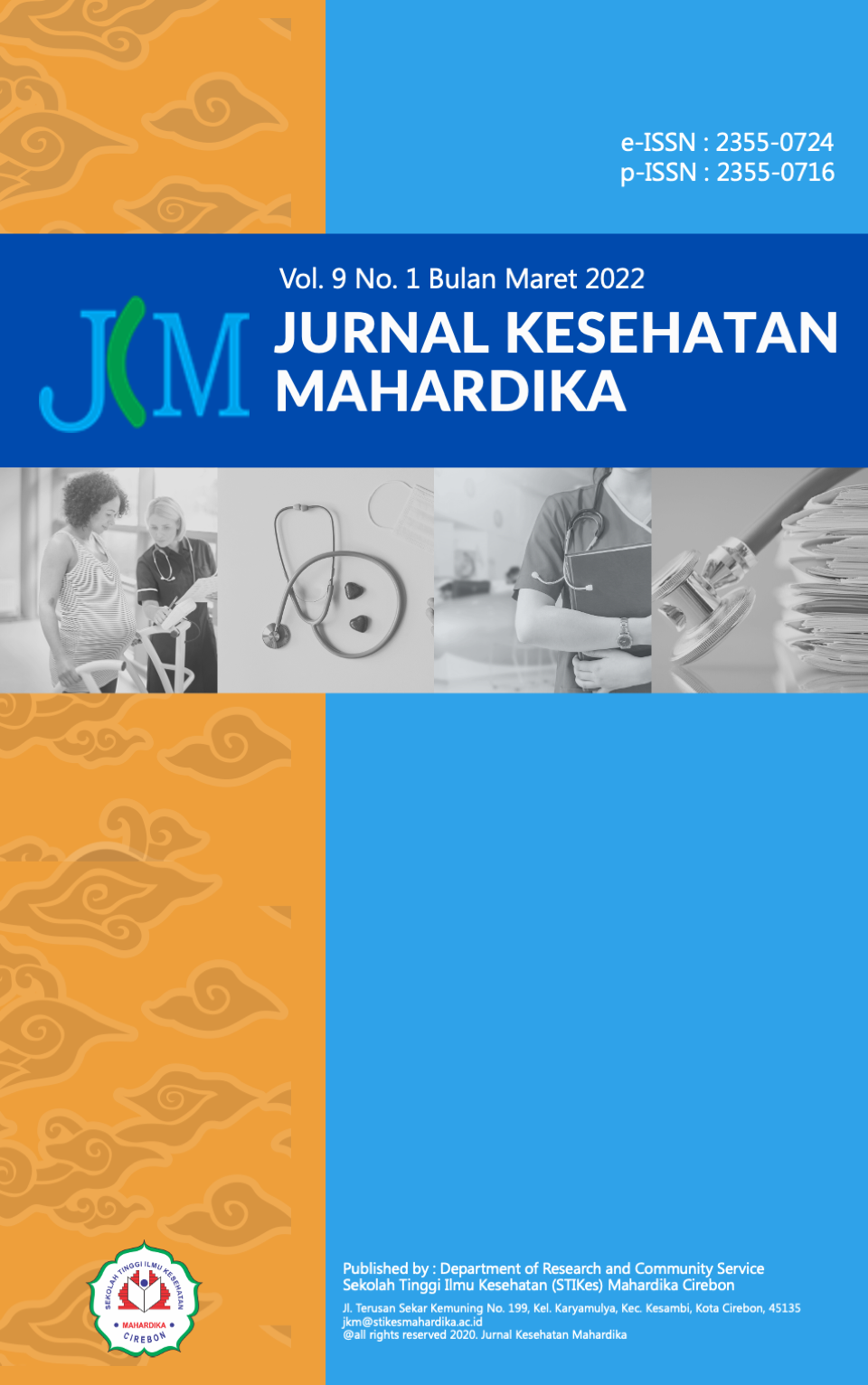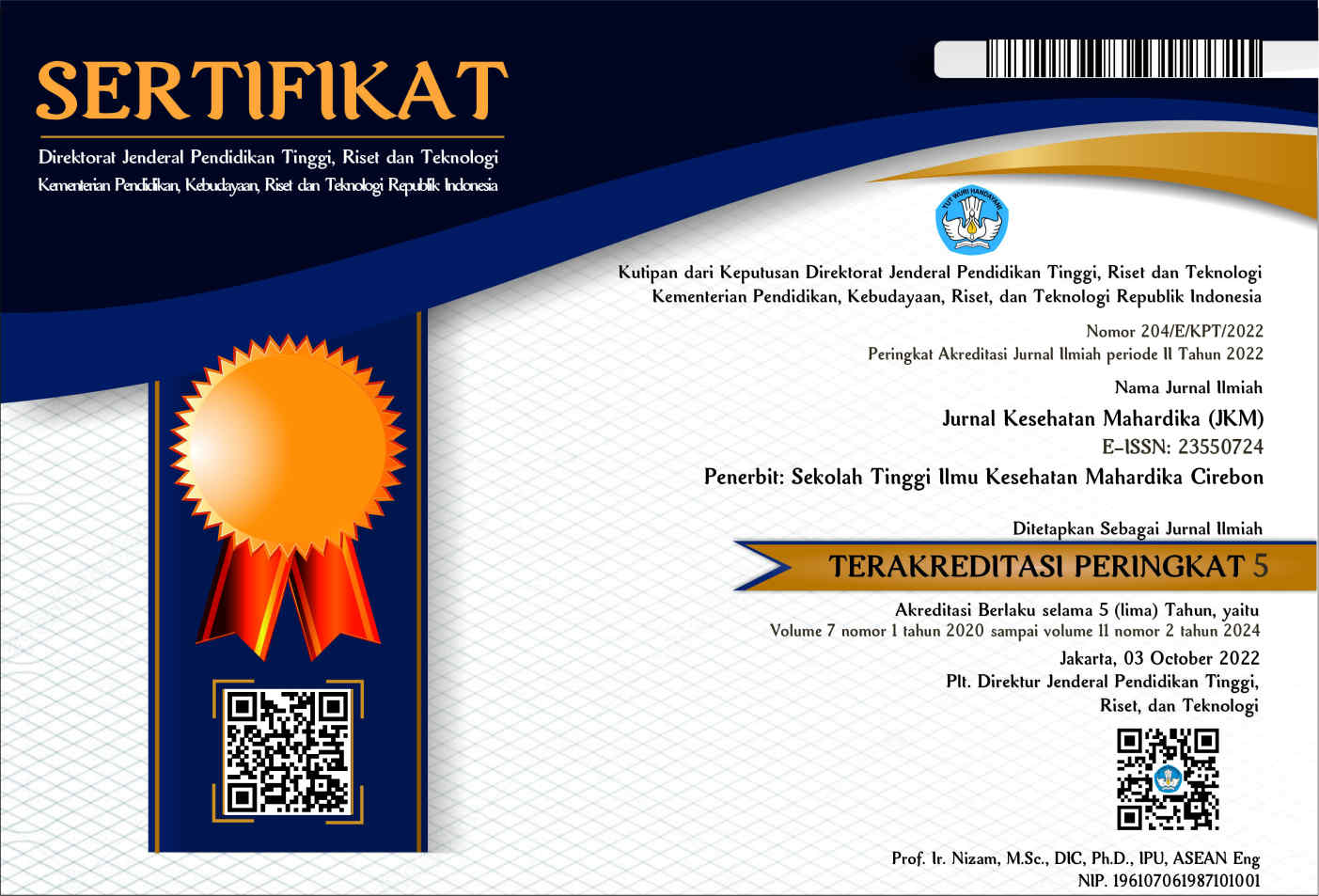Relationship of Self-control With Nomophobia Tendencies During the Covid-19 Pandemic in Students at SMPN 1 Cirebon
Keywords:
Self-Control, Tendency Nomophobia, COVID-19 Pandemic, AdolescentsAbstract
Self-control is a person's ability to resist or encourage desires that will harm oneself or others. Dependence on smartphones has a bad impact on teenagers, one of which is in regulating and controlling themselves. Individuals who are dependent on smartphones are called nomophobia. The purpose of this study was to determine the relationship between self-control andtendencies nomophobia during the COVID-19 pandemic in students at SMPN 1 Cirebon City. This type of research was descriptive correlational with aapproach cross sectional .Sampling using purposive sampling technique amounted to 92 respondents. The instrument used in the form of a questionnaire. Data analysis using thetest spearman rank. The place of research was conducted online during May 2021. Results of Spearman rank P Value = 0.000 < = 0.05 and r = -0.546 < 1 then H0 = rejected meaning that there is a strong and negative relationship between self-control andtendencies nomophobia during the COVID-19 pandemic in students at SMPN 1 Kota Cirebon. The meaning of the negative relationship in this study is that the lower the self-control, the higher the tendency for nomophobia and vice versa.
References
World Health Organization. 2021. WHO Coronavirus (COVID-19) Dashboard [Internet]. Tersedia pada < https://covid19.who.int/> Diakses 1 Maret 2021
Pusat Informasi & Koordinasi COVID-19 Kota Cirebon. 2021. Dashboard Statistik Kasus COVID-19 Kota Cirebon [Internet]. Tersedia pada <https://covid19.cirebonkota.go.id/> Diakses 1 Maret 2021
Pusat Informasi & Koordinasi COVID-19 Provinsi Jawa Barat. 2021. Dashboard Statistik Kasus COVID-19 Provinsi Jawa Barat [Internet]. Tersedia pada <https://pikobar.jabarprov.go.id/> Diakses 1 Maret 2021
Pusat Informasi & Koordinasi COVID-19 Kota Cirebon. 2021. Dashboard Statistik Kasus COVID-19 Kota Cirebon [Internet]. Tersedia pada <https://covid19.cirebonkota.go.id/> Diakses 1 Maret 2021
Asosiasi Penyelenggara Jasa Internet Indonesia . 2020. Laporan Survei Internet: APJII.
Sunarto. 2018. Nomophobia [Internet]. Tersedia pada Diakses pada 6 Februari 2021
Pavithra, D., Olds, W., et al. 2015. A Study on Nomophobia-mobile Phone Dependence among Students of a Medical College in Banglore. National Journal of Community Medicine, Vol. 6, 340-344
Wilantika, C. F. 2017. Pengaruh Penggunaan Smartphone Terhadap Kesehatan dan Perilaku Remaja. Jurnal Obstretika Scientia, 3 (2).
Ghufron, Nur., Risnawati, Rini. 2011. Teori-teori Psikologi. Jakarta: Ar-ruzz Media.
Sariyani. 2017. Hubungan antara Kontrol Diri dan Intensitas Penggunaan Media Sosial dengan Kemampuan Sosialisasi. Psikoborneo. Vol. 5, No. 4
Yuwanto, L. 2010. Cause of Mobile Phone Addiction. Anima Indonesia Psychological Journal. Vol. 25, No. 3, 225-229
Agusta, D. 2016. Faktor-Faktor Resiko Kecanduan Menggunakan Smartphone Pada Siswa di SMK Negeri 1 Kalasan Yogyakarta. E-Journal Bimbingan dan Konseling, 5(3), pp 86-96. Doi: 10.4172/2167-1044.1000296
Risalah, A., Ibad, W., Maghfiroh, L., et al. 2020. “Dampak Pandemi COVID-19 Terhadap Kegiatan Belajar Mengajar di MI/SD”. Journal of Islamic Education at Elementary School. Vol. 1, No. 1, Juni 2020:10-16
Harfiyanto, Doni., Utomo, Cahyo Budi, et al. 2015. Pola Interaksi Sosial Siswa Pengguna Gadget Di SMAN 1 Semarang. Journal of Educational Social Studies. https://journal.unnes.ac.id/sju/index.php/jess/article/view/6859/4925 Diakses 2 Juli 2021
Choliz. (2012). Mobile Phone Addiction in Adolescense. The Test of Mobile Phone Despendence (TMD). Progress in Health Sciences. 2(1).
Fidiana, Naila Rohmati. 2014. Hubungan antara Kontrol Diri dengan Perilaku Delinquency pada Remaja Di SMP Bhakti Turen Malang. Skripsi. Malang: Universitas Negeri Islam Maulana Malik Ibrahim.

Published
How to Cite
Issue
Section
Copyright (c) 2022 Jurnal Kesehatan Mahardika

This work is licensed under a Creative Commons Attribution-NoDerivatives 4.0 International License.












